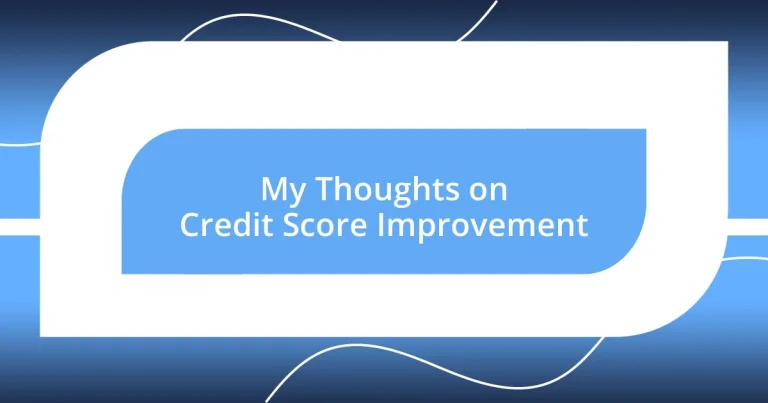Key takeaways:
- Credit scores, ranging from 300 to 850, indicate financial behavior, with payment history and credit utilization being key components affecting the score.
- A good credit score enhances financial opportunities, leading to lower interest rates, higher loan approval rates, and better rental conditions.
- Regularly monitoring credit scores and understanding common myths can empower individuals to make informed financial decisions and improve their credit health.
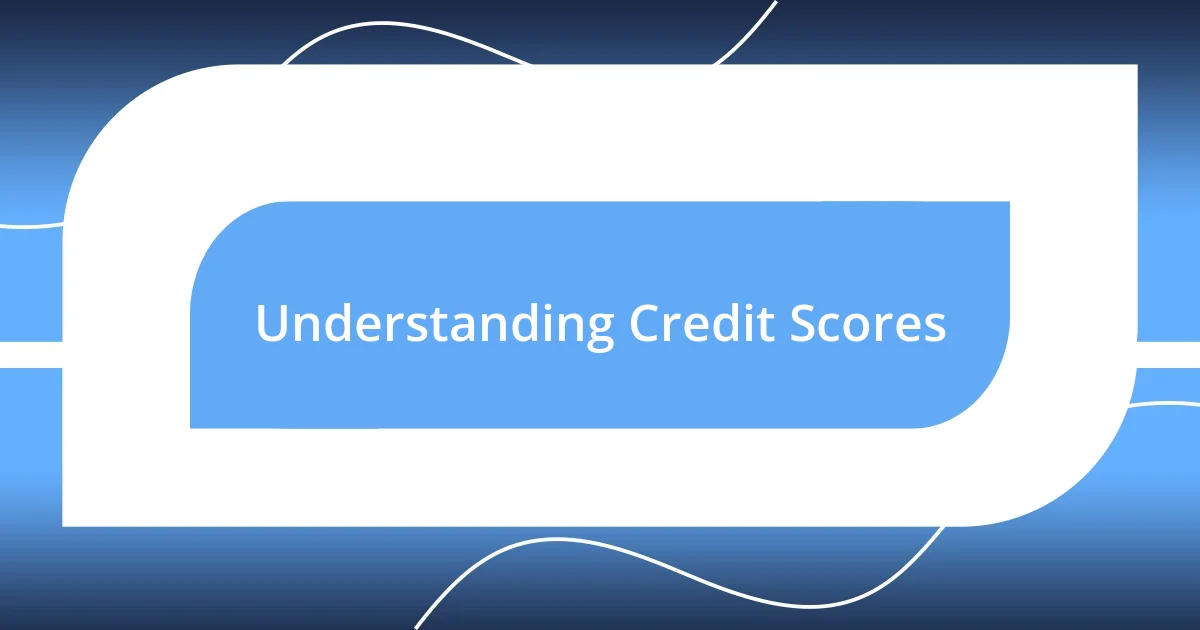
Understanding Credit Scores
Understanding credit scores can be a bit overwhelming, but I think it’s essential to recognize what they truly represent. Your credit score is like a financial report card, reflecting how you handle borrowed money. When I first learned about it, I was surprised to discover that factors like payment history and credit utilization carry so much weight. Have you ever wondered why? It’s because lenders want to gauge the risk of lending to you, and these elements give them significant insight into your financial behavior.
Breaking it down, credit scores generally range from 300 to 850, with higher scores indicating better creditworthiness. I remember my own experience when I checked my score for the first time—it felt like peeking into my financial soul. I realized that even small habits, such as consistently paying off my credit card in full, could boost my score and save me money on interest rates. Isn’t it fascinating how our day-to-day choices can dramatically impact our financial future?
Moreover, understanding the different components of your credit score is vital for improvement. For instance, did you know that making timely payments accounts for around 35% of your score? That realization hit home for me. It motivated me to set reminders for bill payments and to adopt a more disciplined approach to my finances. Knowing these details can empower us to make informed decisions and take control of our credit journey.
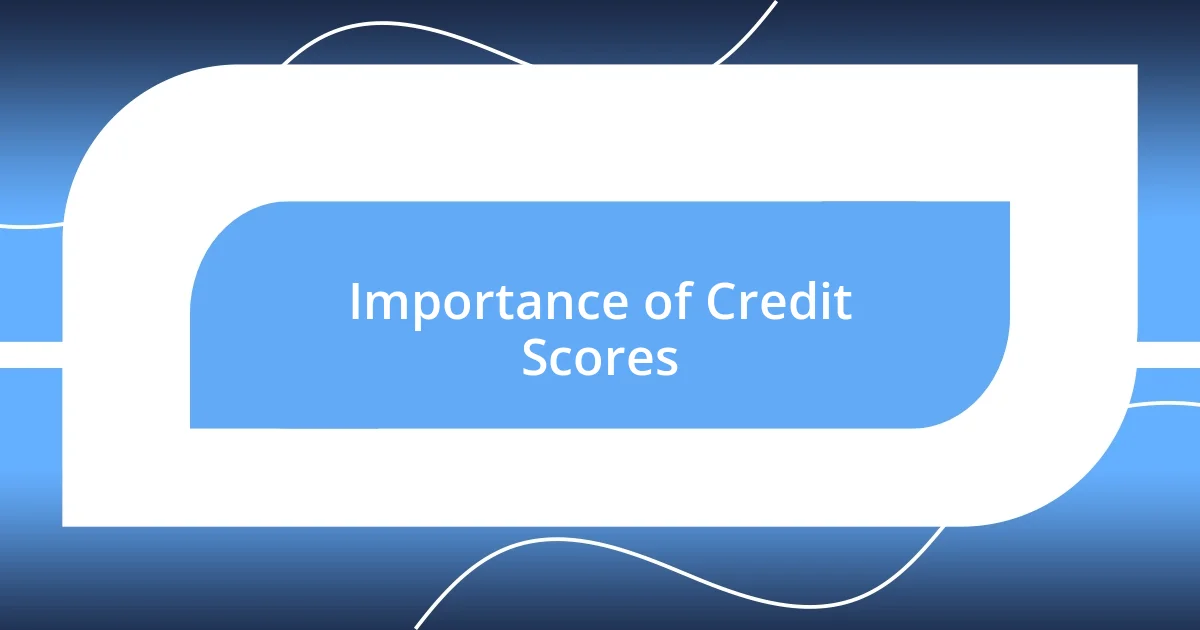
Importance of Credit Scores
Credit scores play a pivotal role in our financial lives, acting as a key factor in determining our ability to secure loans, credit cards, and even rental agreements. I can recall a time when I wanted to buy my first car. The dealership’s willingness to offer me favorable financing hinged entirely on my credit score. It was a wake-up call; I realized just how much this single number could impact my purchasing power and overall financial opportunities.
Understanding the implications of your credit score can significantly influence your lifestyle choices. For instance, a good score can lead to:
- Lower interest rates on loans.
- Higher chances of loan approvals.
- Better insurance premiums.
- Increased rental opportunities.
- Enhanced job prospects in certain industries.
Reflecting on my journey, it makes me appreciate the connection between maintaining a healthy credit score and enjoying a more financially secure life. Each decision I make—like opting for a credit card that offers rewards or making on-time payments—becomes clear when I see the benefits reflected in my credit report. It’s more than just numbers; it’s about crafting the future I envision.

Common Myths About Credit Scores
My experience highlights several persistent myths about credit scores that can mislead individuals striving for better credit health. One misconception is that checking your own credit score can lower it. In reality, this process is known as a “soft inquiry,” which does not impact your score at all. I used to avoid checking my score for fear of negative consequences, but once I learned the truth, I began monitoring it regularly.
Another common myth is that closing old credit accounts will improve your score. I once thought this was beneficial, but I found out that it can actually harm your credit utilization ratio and shorten your credit history, both of which can negatively affect your score. It’s astonishing how many decisions I made based on misunderstandings. Being aware of these myths has empowered me to make informed choices.
Additionally, many believe that only a single missed payment can be detrimental to their score. While it’s true that payment history is crucial, I’ve discovered that the impact of one late payment diminishes over time, especially if you consistently pay on time afterward. This realization helped me be less stressed about occasional mishaps and reinforced my commitment to maintaining good habits moving forward.
| Myth | Truth |
|---|---|
| Checking your own score lowers it | Self-checks are soft inquiries and have no effect |
| Closing old accounts improves your score | It can harm your credit utilization ratio |
| One missed payment is devastating | Its impact lessens with consistent, on-time payments |
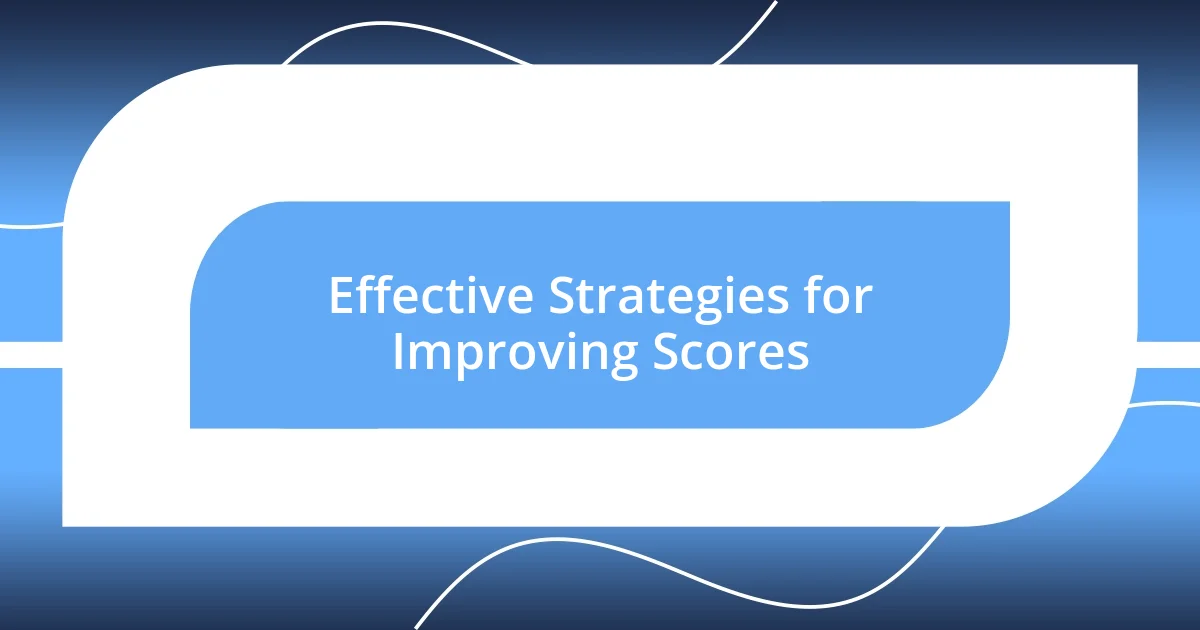
Effective Strategies for Improving Scores
Developing effective strategies to improve your credit score can truly transform your financial landscape. I remember when I started focusing on my credit, one key strategy was ensuring that I paid my bills on time, every time. I set up automatic payments for my bills, which not only helped me avoid late fees but also positively influenced my payment history, one of the most crucial factors in credit scoring.
Another powerful approach is keeping credit utilization low. I was surprised to learn that using more than 30% of my available credit could signal financial distress to creditors. So, I made a conscious effort to utilize only a fraction of my available credit limits, which, in my experience, not only improved my score but also gave me a sense of control over my finances. Have you ever felt overwhelmed by credit card debt? Managing utilization allows you to breathe a bit easier.
Lastly, I realized the importance of diversifying my credit mix. After researching, I discovered that having a mix of credit types—like installment loans and revolving credit—can enhance my score. When I took the plunge and got a small personal loan to finance a project, I was a bit anxious. However, that loan, combined with my existing credit cards, balanced my credit profile and contributed to an increase in my score. Seeing that improvement was both a relief and a motivation to continue applying these strategies.
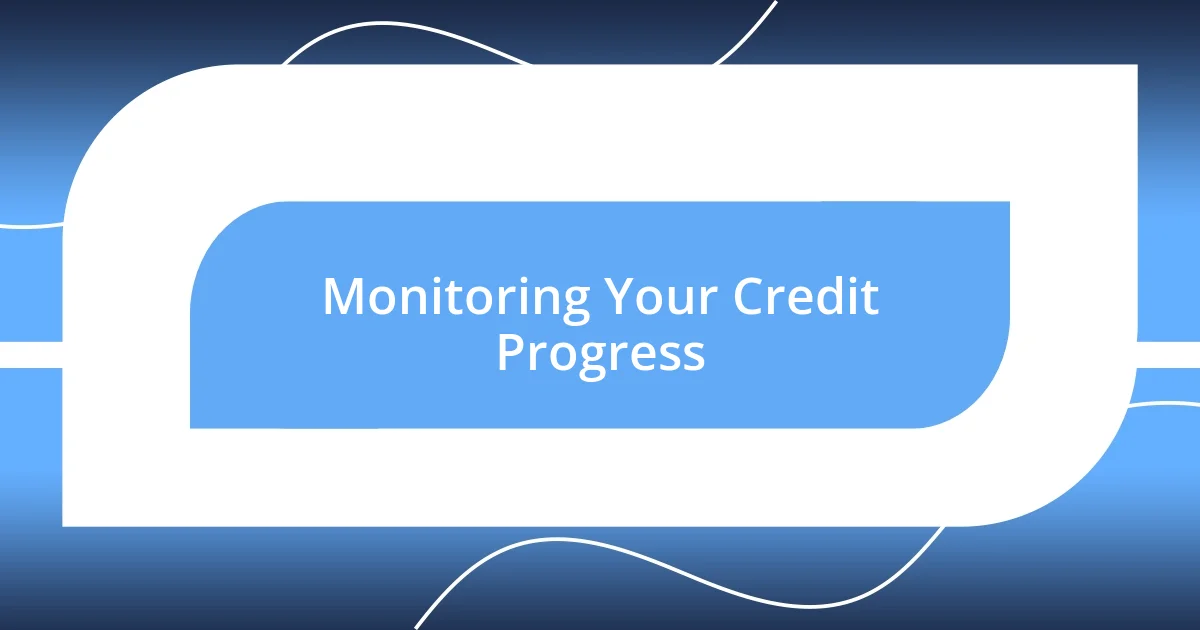
Monitoring Your Credit Progress
Keeping track of your credit progress is essential for informed decision-making. I remember the first time I pulled my credit report; it felt like peeking behind the curtain of my financial life. Setting reminders to review my credit report regularly transformed it into a routine practice, allowing me to catch any inconsistencies early on—what a game-changer!
Another practice that greatly benefited me was using credit monitoring services. I was initially hesitant to invest in one, but the peace of mind it provided was worth it. These services alert you to significant changes in your score or unusual activity, instilling a sense of control over my financial journey. Have you ever felt unsure about where you stand with your credit? Those alerts felt like having a financial buddy looking out for me.
Moreover, I found it helpful to track my score across different platforms. Watching the score fluctuate in response to my efforts made the process feel tangible and rewarding. It’s almost exhilarating to see the upward trend as a direct result of my diligence. I often asked myself, “What can I do today to keep it moving in the right direction?” This mindset encourages accountability and reinforces my commitment to improving my credit health.
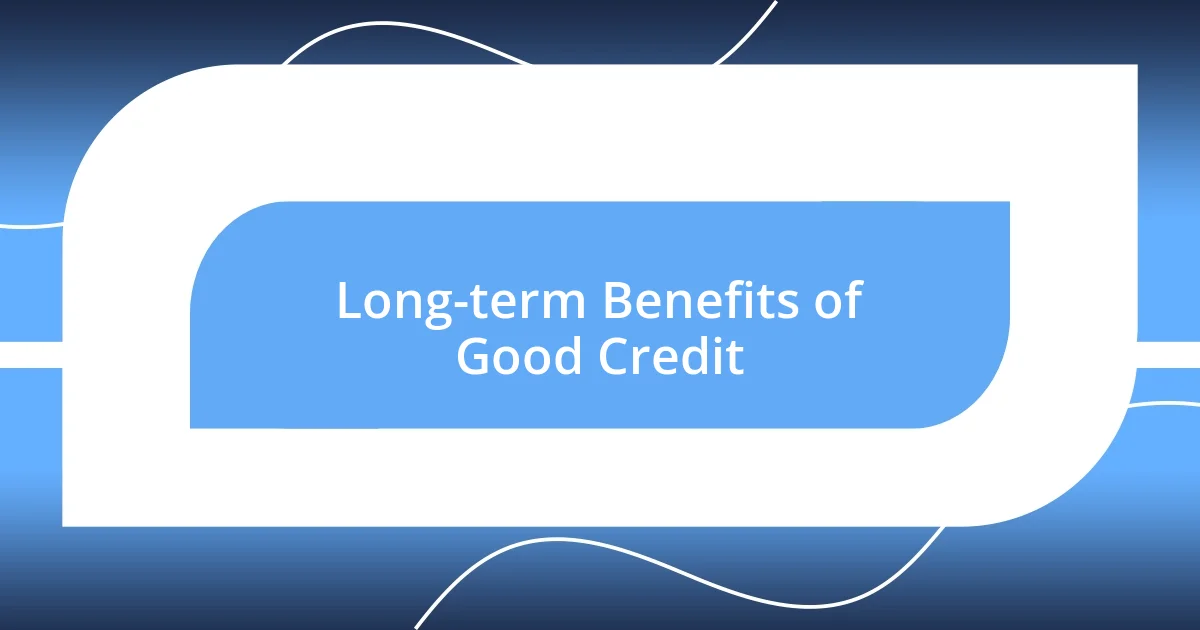
Long-term Benefits of Good Credit
Investing in good credit has remarkable long-term benefits that can shape your financial future for years to come. Once I began to see the fruits of my efforts, I found myself qualifying for lower interest rates on loans and credit cards. It felt incredible to realize that my past diligence could save me so much money over time—who doesn’t want to reduce their expenses?
Another benefit I experienced was the increased likelihood of credit approvals. There was a moment when I applied for a mortgage; I was anxious but hopeful. To my delight, my good credit score set me apart from other applicants. It made the whole process smoother and left me feeling empowered, knowing that my hard work paid off.
Furthermore, having good credit can even open doors to unexpected opportunities, like renting a desirable apartment without the friction of a high security deposit. I learned that many landlords check credit scores, and mine gave me the confidence I needed while house hunting. Can you imagine the relief of securing a great place with no hassle? Good credit not only makes financial transactions easier but also brings peace of mind in a world where financial opportunities and challenges coexist.
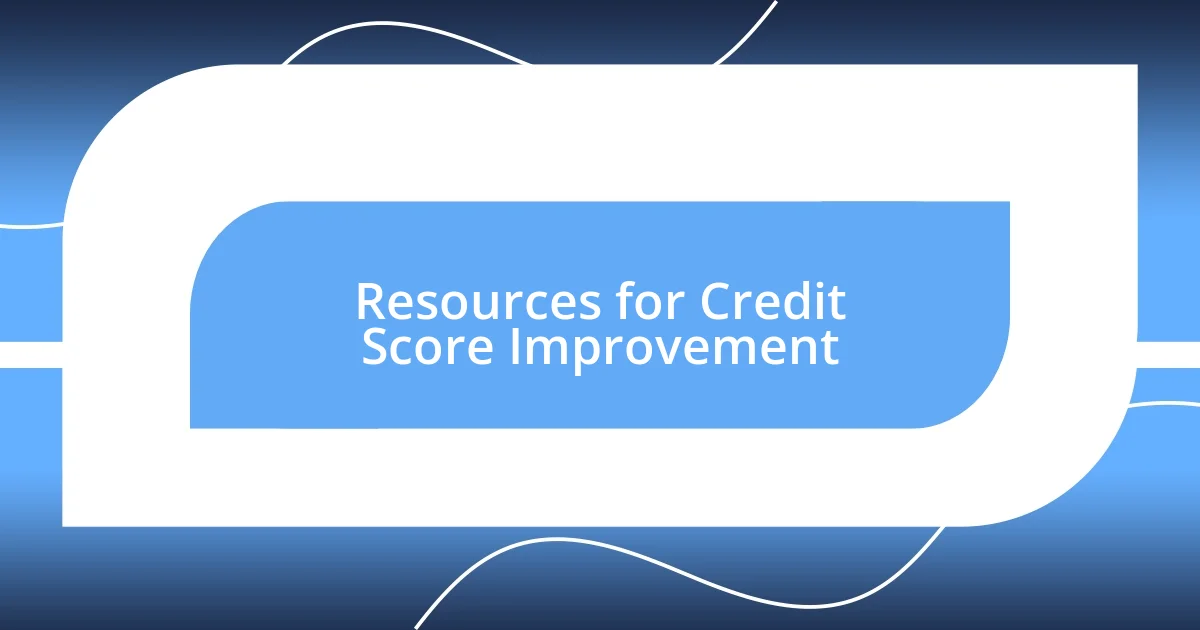
Resources for Credit Score Improvement
One of the most valuable resources I discovered for credit score improvement was educational websites dedicated to personal finance. I remember diving into articles filled with tips and tricks that opened my eyes to strategies I had never considered. Have you ever thought about how easily a single article can shift your perspective? It’s like stumbling upon a treasure chest of knowledge that empowers you to take action.
Additionally, I found community forums to be incredibly useful. Engaging with others who share similar financial goals created a sense of camaraderie. I recall a specific moment when someone shared their journey of raising their credit score from a low point to a respectable level. The encouragement and practical advice I gleaned from those conversations spurred me into action, showing me I wasn’t alone on this path.
Lastly, utilizing mobile apps for tracking spending and budgeting proved to be a game changer for me. With notifications reminding me of outstanding bills, I avoided late payments that could negatively impact my credit score. It’s fascinating how a small tool in my pocket transformed my financial discipline. Have you ever wondered how much easier everyday management could be with the right apps? It really makes a difference.












